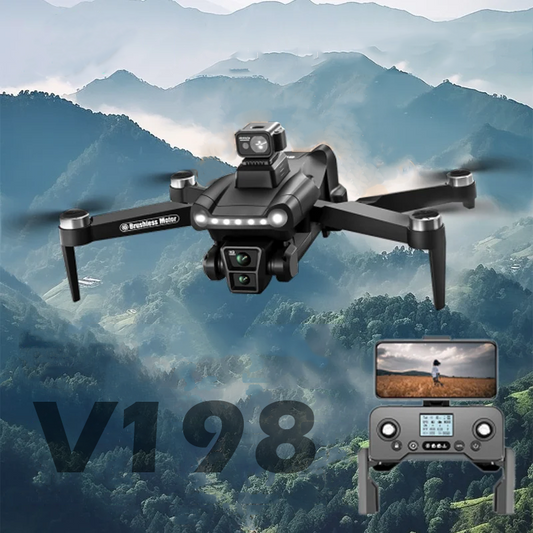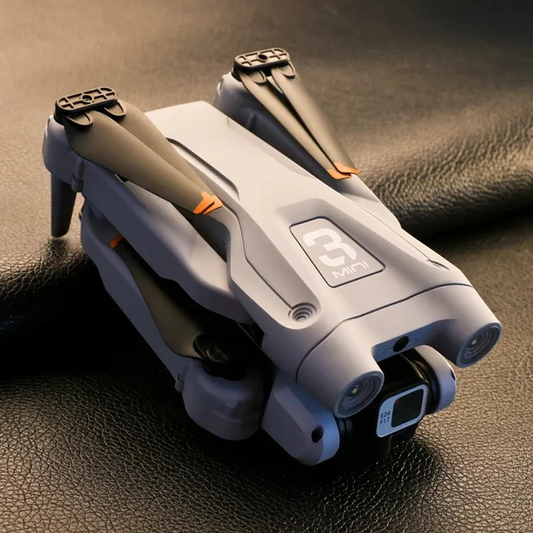Drones in Agriculture: Revolutionizing Farming Practices

In the ever-evolving landscape of agriculture, technology continues to play a pivotal role in shaping the future of farming practices. One such innovation that has gained significant traction in recent years is the use of drones in agriculture. These unmanned aerial vehicles (UAVs) are transforming the way farmers manage their crops, monitor fields, and make crucial decisions. In this article, we will delve into the impact of drones on agriculture, exploring the various ways they are revolutionizing traditional farming practices.
1.Precision Agriculture: Enhancing Efficiency and Accuracy

Drones are becoming indispensable tools in the realm of precision agriculture, enabling farmers to monitor and manage their fields with unprecedented precision. Equipped with advanced sensors and imaging technologies, drones can capture high-resolution aerial images of farmland. This aerial data provides valuable insights into crop health, soil conditions, and pest infestations.
Precision agriculture involves using this data to make informed decisions regarding irrigation, fertilization, and pesticide application. By identifying specific areas of concern, farmers can optimize their use of resources, reduce waste, and ultimately enhance crop yields. This targeted approach not only improves efficiency but also has positive implications for environmental sustainability.
2.Crop Monitoring and Health Assessment

Drones equipped with multispectral and thermal cameras allow farmers to monitor the health of their crops in real-time. These sensors can detect subtle changes in plant health, such as nutrient deficiencies, water stress, or the presence of pests and diseases. The ability to identify issues early on enables proactive measures, preventing potential crop losses and minimizing the need for extensive chemical treatments.
Through regular drone flights, farmers can create detailed maps of their fields, highlighting areas that require attention. This proactive approach to crop monitoring not only improves the overall health of the crops but also contributes to resource optimization, as interventions can be targeted only where needed.
3.Efficient Crop Scouting and Field Inspection

Traditionally, farmers relied on manual crop scouting to identify issues such as disease outbreaks or pest infestations. This process was time-consuming and often resulted in delayed responses to emerging threats. Drones have revolutionized crop scouting by providing a rapid and comprehensive overview of large agricultural landscapes.
A drone can cover vast areas of farmland in a fraction of the time it would take a human, capturing detailed images and data along the way. This efficiency allows farmers to detect and address potential problems promptly. Additionally, drones equipped with high-resolution cameras can assist in field inspections, helping farmers assess the condition of crops and infrastructure, such as irrigation systems and fencing.
4.Precision Planting and Seeding

Drones are not limited to monitoring and assessment; they are also being employed for precision planting and seeding. Equipped with the necessary technology, drones can distribute seeds with remarkable accuracy, ensuring optimal spacing and depth. This precision planting contributes to uniform crop growth and can lead to higher yields.
The ability to access challenging or remote terrain is another advantage of using drones for planting. Areas that may be difficult or time-consuming for traditional planting methods become accessible through drone technology. This expands the possibilities for cultivation, making it feasible to plant crops in locations that were previously considered impractical.
5.Water Management and Irrigation Optimization

Water scarcity is a pressing concern in many agricultural regions. Drones play a crucial role in water management by providing insights into soil moisture levels and irrigation needs. Thermal imaging cameras on drones can identify areas with insufficient water supply, allowing farmers to adjust irrigation strategies accordingly.
By optimizing irrigation practices, farmers can conserve water resources and reduce the environmental impact of agriculture. Drones offer a dynamic and efficient means of monitoring the effectiveness of irrigation systems and ensuring that water is applied precisely where and when it is needed.
6.Data-Driven Decision Making

The wealth of data generated by drone technology empowers farmers to make well-informed decisions. Analyzing aerial imagery, sensor data, and other collected information allows farmers to gain a deeper understanding of their fields. This data-driven approach enables strategic planning, helping farmers adapt to changing conditions, mitigate risks, and maximize productivity.
Farm management software integrated with drone data further enhances decision-making capabilities. These tools can process and analyze large datasets, providing actionable insights that contribute to more effective and sustainable farming practices. The synergy between drones and data-driven decision-making is a key driver in the ongoing agricultural revolution.
In conclusion, drones are revolutionizing farming practices by introducing a new era of precision, efficiency, and sustainability. From crop monitoring and health assessment to precision planting and irrigation optimization, these unmanned aerial vehicles are proving to be invaluable tools for modern farmers.
As technology continues to advance, the integration of drones into agriculture is likely to become even more sophisticated. The ongoing development of artificial intelligence, machine learning, and automation will further enhance the capabilities of agricultural drones, opening up new possibilities for increased productivity and environmental stewardship.
The adoption of drones in agriculture represents a paradigm shift in the way farmers approach their craft. By embracing this technology, farmers can navigate the challenges of modern agriculture with greater resilience and effectiveness. As drones continue to evolve, their role in shaping the future of farming practices is poised to become even more prominent, ushering in a new era of sustainable and efficient agriculture.
Explore a variety of drones at our online drone store.
Happy Flying!









